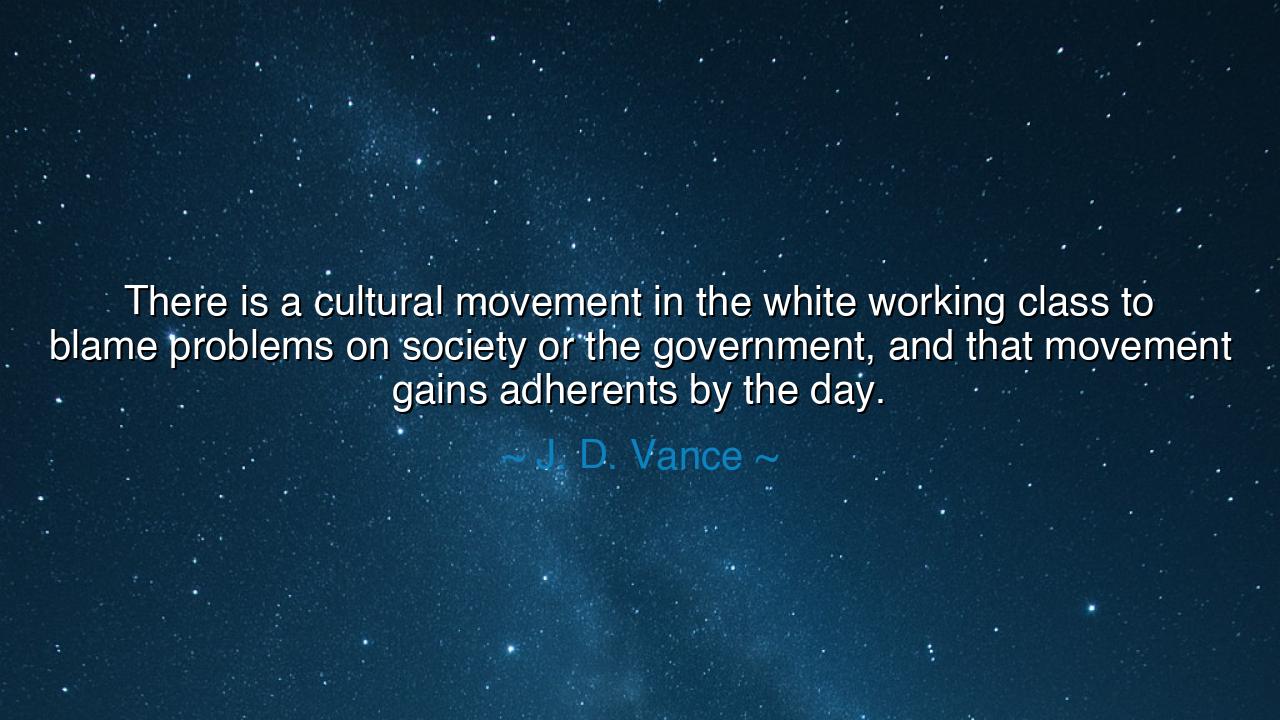
There is a cultural movement in the white working class to blame
There is a cultural movement in the white working class to blame problems on society or the government, and that movement gains adherents by the day.






In an age of disillusionment and despair, when faith in institutions wanes and the strength of personal will is tested by hardship, J. D. Vance—a man who rose from the depths of poverty to the heights of public life—spoke these piercing words: “There is a cultural movement in the white working class to blame problems on society or the government, and that movement gains adherents by the day.” His message, drawn from the marrow of lived experience, is both a lament and a call to arms. He does not condemn the suffering of the working class, for he knows it well; rather, he warns that the loss of self-belief, the surrender of agency to resentment, is the beginning of ruin.
In his book Hillbilly Elegy, Vance laid bare the struggles of a people forgotten by prosperity—men and women of the American heartland, whose labor once forged the engines of the world. He saw in them both dignity and decay: the dignity of endurance, and the decay of spirit that comes when hope turns outward in blame rather than inward in resolve. His words echo the ancient truth that victimhood, when embraced as identity, becomes a chain. For every people who forget their own strength, who cease to believe in their capacity to change their condition, become captives not of government or circumstance, but of their own despair.
To blame society or the government for one’s every misfortune is to surrender one’s sovereignty. It is to cast away the birthright of human agency that has lifted civilizations from the dust. In every age, the weak have sought excuses, and the strong have sought purpose. The ancients knew this well: the Stoic philosopher Epictetus, himself born a slave, taught that the only true prison is the one we build within our minds. He said, “It is not what happens to you, but how you react to it, that matters.” So too does Vance remind us that culture, not fate, shapes destiny—that the spirit of a people can either rise above hardship or sink into it, depending on whether they choose responsibility or resentment.
But Vance’s warning is not without compassion. He does not scorn the working class whose anger he describes. He grew among them, felt their pain, and still honors their worth. He simply sees that anger without action, and blame without introspection, lead only to stagnation. Consider the story of the Rust Belt towns—once vibrant with industry, now hollowed by economic decline. Many who live there look to Washington, to Wall Street, or to foreign nations for the source of their suffering. And while these forces surely play their part, the deeper wound lies in the erosion of community, the loss of purpose, and the fading of faith in one’s own power to build anew. When the hammer is laid down, the craftsman’s soul fades with it.
In this, the wisdom of the ancients speaks again. When Rome began its slow fall, its citizens ceased to see themselves as participants in their empire’s greatness and began to see themselves as victims of corruption and decay. Bread and circuses replaced duty and discipline; complaint replaced contribution. The glory that had once been carved by their ancestors was squandered by their apathy. So too, warns Vance, may a society perish when it forgets the virtue of work, the honor of perseverance, and the sacred duty of self-reliance. The moment a people see themselves only as the wronged, and never as the responsible, they begin to crumble from within.
Yet, let no one mistake Vance’s message for cruelty. His call is one of renewal, not condemnation. For the cure to despair is not found in blame, but in action—in the quiet heroism of those who take ownership of their lives, no matter how hard the world presses against them. He urges his people to remember their strength: to rebuild families, to teach their children pride, to return to the virtues that once sustained them—discipline, courage, faith, and responsibility. These are not relics of the past; they are the eternal engines of progress, the fires that forge nations and souls alike.
And so, my children of the modern age, hear this teaching and carry it within your hearts. When hardship comes, as it always does, do not look first to others for rescue. Look within. Do not curse the government, nor despise society, before you have exhausted your own will. Seek not pity, but purpose. For the world owes you nothing, yet it offers you everything if you dare to take it with open hands and willing heart.
Thus, remember the wisdom of J. D. Vance: the spirit of a people cannot be restored by blame—it can only be reborn through responsibility. Let no man or woman believe themselves powerless, for the mightiest revolutions begin not in governments, but in hearts awakened to their own strength. When you reclaim your agency, you reclaim your freedom. When you stop pointing outward and start building upward, you become not the victim of your age, but its redeemer.






AAdministratorAdministrator
Welcome, honored guests. Please leave a comment, we will respond soon